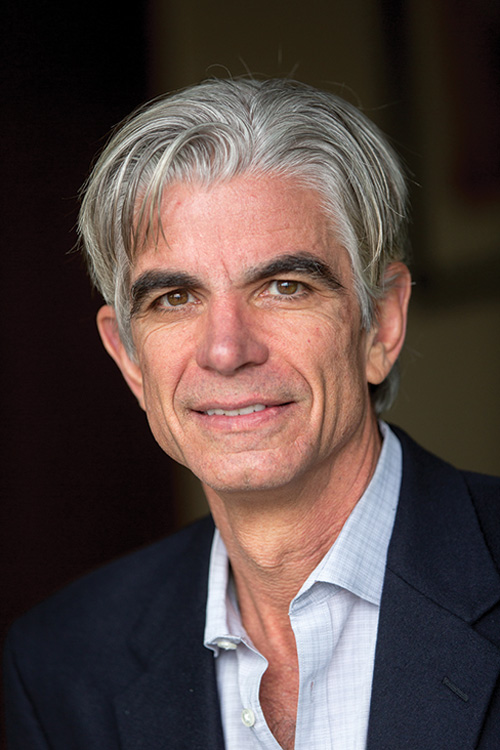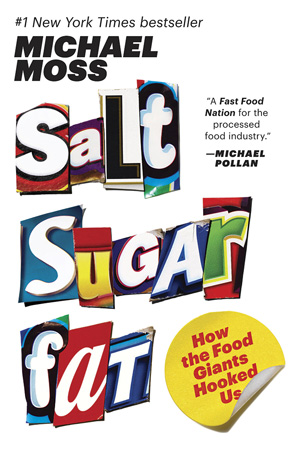Worth His Salt

Michael Moss, author of the bestseller “Salt, Sugar, Fat,” tells of the SF State professor who accidentally steered him away from class and toward winning a Pulitzer Prize. Photo by Daniel Sheehan.
The war in Iraq is nearly two years old when an editor suggests I take a close look at the Pentagon, since soldiers are dying in soaring numbers for lack of simple armor for their bodies and trucks.
A nursing home purchased by a Wall Street firm is evicting its poorest residents when a 90-year-old woman in a wheelchair offers to get me past the reception desk to see the fight they’re putting up.
A 22-year-old dance instructor, paralyzed from the waist down after eating a hamburger tainted by e. coli, urges me to look hard at the industry making our meat.
A source in that same industry steers me to an even larger public health problem caused by three things that food manufacturers are willfully adding to their products — namely, salt, sugar and fat, in heaping amounts.
The first two tips resulted in articles that became Pulitzer Prize finalists. The third story, on the burger, won. And the fourth investigation turned into a 2013 book that rose to the No. 1 spot on the New York Times bestseller list. But there is another pattern in these episodes that I find more interesting. Someone, somewhere, has always prodded me to get up, take a little risk and do something worthwhile with whatever talent I’d scraped together, and mostly with pretty decent results when I actually listened and took action.
Of course, all this poking began with my mom, an Oklahoma City gal who took the train to San Francisco at age 18 and never went back, much like her great grandmother, who had left Prague for Chicago at the same age. There was a big moment for me, too, at Lowell High School, where the late Ms. Elizabeth J. Shafer taught English and journalism in Room 251 and said to me, simply, “You have a knack for this.” Since I tended to hang out in a disreputable part of campus known as The Pit more than I boned up on my chemistry labs, it was about the nicest thing any of my teachers said. So I started sending story ideas to magazines and amassing the requisite shoebox full of pink rejection slips.

But really, the biggest moment of serendipitous prodding came at San Francisco State University, where the late Georg Treichel kicked me out of his class. Actually, that’s not quite right, and it’s helpful to remember him properly before I lay out the real story. He was the most insatiably curious person I ever met. He started off in the biology department and moved to geography, I suspect, to take more of the excursions for which he was famous and loved: on trains, in boats, with his adoring students. I think he saw some of me in him, or else just thought I was bored, when he ushered me out of his class to volunteer as a writer for the Sierra Club, which eventually hired me.
That was a cushy job down on Grant Street next to the entrance to Chinatown, compared with my previous employment at the H. Salt Esquire fish and chips shop on Ocean Avenue (where I once got held up at gunpoint and locked in the freezer) or the garden center on Sloat Boulevard across from the zoo where I loaded leaky bags of cow manure into the car trunks of senior citizens. The Sierra Club led to a newspaper job in Wyoming, where I replaced a reporter who died in a car crash hitting a horse — or was it a cow? — that had strayed on to the Shoshone reservation.
And so my reporting career progressed, from Newsday to The Wall Street Journal to The New York Times. My second favorite story to tell aspiring journalists at Columbia University in New York, where I was an adjunct professor for 10 years, was about getting fired from my first daily newspaper job in Colorado for insubordination. And my favorite story: how I never actually graduated from SF State, running instead with that Sierra Club job, and Ms. Shafer’s encouragement, though I’d quickly add for the students’ sake that that isn’t a path they should take in today’s more difficult economy.
My oldest son is now 16 and starting the college hunt. And I’m doing my best to bite my tongue. He’s been working hard and will make a terrific college choice. But privately, I couldn’t hope for a school for him that is any better than SF State, with teachers like Georg Treichel and the heartfelt cajoling to get up and go do something worthwhile.
By MICHAEL MOSS